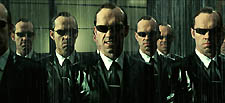Revolutionary
The Matrix Revolutions
 |
Matrix fans, you can exhale now. And rejoice. The Wachowski Brothers have done their trilogy proud, bringing it to a satisfying action-crammed, effects-laden conclusion that ties up all the loose threads — often in unexpected ways — and yet leaves a few questions unanswered for hours of pondering afterwards.
By itself, the action and narrative path in The Matrix Revolutions would be enough for an epic. And yet, when taken in conjunction with the previous two films, it concludes a trilogy that is arguably one of the most ambitious filmmaking projects ever undertaken, coming in just behind that other massive cinematic trilogy — the one based on those books by J.R.R. Tolkien — from which The Matrix borrows somewhat liberally, but never disrespectfully.
Actually, The Matrix Revolutions pays homage to more films than the previous two outings, with obvious references to Aliens, Empire Strikes Back, Return of the Jedi, Superman, High Noon and almost any Hong Kong martial arts and World War II movie ever made. And yet, The Matrix Revolutions is so thoroughly captivating from start to finish, so adrenaline pumping are its action setpieces, that it never truly feels derivative.
 |
Anyone who hasn’t seen the first two films — or who has seen the first, but not the second — needn’t bother with this finale. You might be wowed by its visual punch, but you won’t even begin to latch onto the narrative nuances. Take my advice, do your homework and watch the first two films on DVD before venturing into this labyrinth of humankind versus machine in which a virtual, chilly reality controlled by computer programs faces off against a tangible reality dictated by love, passion and freedom of choice.
 |
The film starts precisely where The Matrix Reloaded left off — with Neo’s comatose body on a slab. Neo (Keanu Reeves) is being held captive in an unreachable netherworld by a program, and the movie’s first act follows the efforts of Trinity and Morpheus (Carrie-Anne Moss and Laurence Fishburne) to rescue their hopeful savior. Which means paying a visit to the deliciously sinister Merovingian (Lambert Wilson), who “does not forget and does not forgive ” and makes a request that is maliciously audacious. While the sequence is exciting and evocative of the first movie, it hardly prepares you for what comes next: a battle royale as the machines drill trough the outer dome of Zion, the last human outpost, and dispatch a swarm of insect-like, tentacled sentinels to eradicate humanity. It’s the centerpiece of the film — worthy of any climax — and yet it’s not the climax. That’s still to come — and it involves a rain-soaked clash of two titans: Neo and Agent Smith (Hugo Weaving) who has now replicated himself beyond all measure.
The Wachowskis anticipate our expectations — and then throw in enough wrenches to alter the course of the action. There are no guaranteed outcomes in Revolutions. Even the Oracle (Mary Alice, replacing the late Gloria Foster) can’t quite predict how everything will wind up.
 |
This third film seems even less groundbreaking than the first. And yet no expense has been spared in creating a vision of battle that, quite frankly, has never before been seen on such a large scale. The spectacle alone is almost overwhelming at times, and it leaves you blissfully exhausted.
Revolutions includes a lot of philosophical and spiritual hoo-ha that will keep the devoted analyzing and debating for hours, weeks, months, maybe even years. Essentially, however, the trilogy’s thematic purpose boils down to one primary theme: what people will do for love.
Reeves carries out his role of a lifetime with a monochromatic delivery that is offset by stoic sense of purpose. It’s Moss, however, who bores into the film’s emotional core as Trinity. Jada Pinkett Smith gets an expanded role, as does Nona Gaye, and both rise with muscle to the occasion, while Fishburne is shifted somewhat to the background.
 |
While Foster’s slightly acerbic Oracle is missed, Mary Alice does a fine job of replacing her with a character that is slightly warmer in nature and very much resigned to her fate. Collin Chou lends confidence and presence as her charge, Seraph, and as Mifune, Nathanial Lees is every war movie general to ever grace the screen wrapped up in one glorious package. Meanwhile, Clayton Watson is every wide-eyed, gung-ho private you’ve ever seen, a boy who must make a leap to manhood by pitting himself against all odds during a furious, frenzied battle.
|
If the movie belongs to anybody, however, it belongs to Hugo Weaving, who, with his jarringly precise manner of speech, brings a startling and chilling complexity to Agent Smith. As the films have progressed, so has Smith’s omnipotence, and Weaving plays it out with a blazing arrogance and deep-seated malevolence that ranks with the greatest of all movie villains.
My biggest hurrah is reserved for visual effects supervisor John Gaeta, who has, in all three films, made the unbelievable believable. The effects for this final film must have cost a fortune — and yet the money has been exceedingly well spent, with attention paid to the most painstaking of details. Ironically, however, the most stunning shot in Revolutions arrives late in the third act. It’s a simple shot, but it’s one of such breathtaking beauty and pastoral eloquence, it make you gasp aloud. It is, in effect, the movie’s defining moment, one that shows exactly what these characters — knowingly or not — have been fighting for all along.
Support Metro Weekly’s Journalism
These are challenging times for news organizations. And yet it’s crucial we stay active and provide vital resources and information to both our local readers and the world. So won’t you please take a moment and consider supporting Metro Weekly with a membership? For as little as $5 a month, you can help ensure Metro Weekly magazine and MetroWeekly.com remain free, viable resources as we provide the best, most diverse, culturally-resonant LGBTQ coverage in both the D.C. region and around the world. Memberships come with exclusive perks and discounts, your own personal digital delivery of each week’s magazine (and an archive), access to our Member's Lounge when it launches this fall, and exclusive members-only items like Metro Weekly Membership Mugs and Tote Bags! Check out all our membership levels here and please join us today!
























